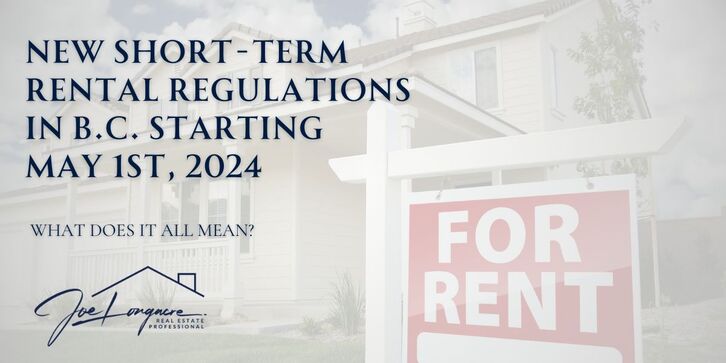|
Some new rental regulations are taking affect here in British Columbia as of May 1st, 2024 & it is certainly stirring up some conversation. The intent from the provincial government is to stop real estate investors from buying up what is already a lack of inventory in the housing market, and turning them into AirBnB's, VRBO's, or other vacation based rentals. Did you know there is roughly 20,000 homes/units in the province being used for these purposes? The goal of this new legislation is that this will bring more inventory to the long-term rental market, as those rates have soared in the recent years. The hope is that bringing more inventory to the market will ease a bit of that pain. Additionally, the other idea is that investors that do have multiple properties, and don't want to play the landlord/long-term tenant game, might be more inclined to sell these places, in-turn bringing more inventory to the real estate market for buyers as well.
I will not get into my opinion on all of this, as that is not my intention of this post. Instead, I simply want to lay out the guidelines of this new legislation to make it easily understandable for those who wish to know the details around, what is allowed, what isn't and break the regulations down to digestible chunks. So that said, let's get into it.... 1. Definition of Short-Term Rentals Under the new regulations provided by the province, any rental arrangement with a duration of less than 90 days falls under the category of short-term rentals. This includes a wide range of accommodations, from vacation homes to spare rooms rented out on platforms like Airbnb. In the city of Vancouver however, a short-term rental is any rental under 30 days. 2. Location Restrictions One of the most significant changes is the restriction on where short-term rentals can operate. Hosts will only be permitted to offer short-term rentals in their principal residence plus one secondary suite or accessory dwelling unit. This means that if you're renting out a property, it must be your primary place of residence(where you receive mail, live majority of your year, are registered for taxes, etc.) with the option to rent out an additional unit on the property like a laneway house or garden suite. However, this is different in Vancouver for example. In Vancouver you can only short-term rent the actual dwelling you live in, and not a secondary unit like a basement suite or laneway house, those must be used for long-term rental(31 days or more). This can get quite confusing as there is quite a bit of variance throughout the province. That said, it is important to look into each areas guidelines, as communities are able to file for special regulations at a more local level. This especially applies to communities of less than 10,000 people or that heavily rely upon tourism. This link will lead you to an interactive map that provides the different information for different regions: https://www2.gov.bc.ca/gov/content/housing-tenancy/short-term-rentals/principal-residence-requirement#PRmap 3. Registration and Licensing Requirements To operate a short-term rental legally, hosts must obtain a valid registration number and a business license number. The registration process will require detailed information about the property, including the address, contact details, and a declaration confirming that it is the host's principal residence. Click here to apply for your permit in Vancouver. This is the first hurdle to clear if you are looking at doing short-term rental, if you are doing this from your principle residence and it is a detatched house that makes things a bit easier. If not, and it is an apartment, condo, or townhouse, you also have to look into strata by-laws, as those can also prohibit you to do short-term rental. Many buildings do not allow for it no matter if you are living in the place or not. 4. Enforcement and Penalties Some of these restrictions or regulations are not new but what is new is the provincial government getting involved and monitoring this much closer. With that the penalties for non-compliance have been drastically increased. The new regulations can result in fines of up to $3,000 per day, effective as soon as the Act receives Royal Assent, which is expected in the near future. It's crucial for hosts to ensure they meet all requirements to avoid facing hefty penalties. 5. Provincial Registry A provincial registry is set to launch in late 2024, requiring platforms like Airbnb to remove listings that do not have a valid registration number. This initiative aims to streamline the regulation process and ensure that all short-term rental operators are operating within the legal framework. 6. Local Bylaws While the provincial regulations set a baseline, local governments retain the authority to implement more restrictive bylaws based on their specific needs. Cities like Vancouver and Burnaby already have stringent regulations in place, allowing short-term rentals only in the principal residence and imposing additional restrictions on secondary units. In conclusion, the upcoming changes in BC's short-term rental regulations signify a shift towards more stringent oversight and regulation of the industry. Hosts must familiarize themselves with the new requirements and ensure compliance to avoid potential fines and penalties. Additionally, staying informed about any updates or changes to local bylaws is essential for maintaining legal compliance and operating a successful short-term rental business in British Columbia. Here are a couple links to the B.C. government websites that include this information: https://www2.gov.bc.ca/gov/content/housing-tenancy/short-term-rentals/short-term-rental-legislation Vancouver Specific: https://vancouver.ca/doing-business/short-term-rentals.aspx If you have any questions about these new regulations, I am happy to answer any questions. Additionally, I don't mean to spark any major debates here, but I would love to hear your thoughts on the whole thing. Feel free to drop your comments or questions below and I will address them. If you currently have short-term rentals and want to have a private conversation to further understand things, and come up with a game plan you can give me a call at 778-927-4306 and let's chat about the options for your scenario.
0 Comments
Leave a Reply. |
AuthorJust sharing general knowledge as it comes my way, in hopes of helping address common questions asked. Archives
April 2024
Categories |
Contact:Phone : 778-927-4306
Email: [email protected] Address: Macdonald Realty Attn: Joe Longacre 2057 Commercial Drive Vancouver, BC V5N 4B1 |
|
Macdonald Realty Ltd.
|
The data relating to real estate on this website comes in part from the MLS® Reciprocity program of either the Real Estate Board of Greater Vancouver (REBGV), the Fraser Valley Real Estate Board (FVREB) or the Chilliwack and District Real Estate Board (CADREB). Real estate listings held by participating real estate firms are marked with the MLS® logo and detailed information about the listing includes the name of the listing agent. This representation is based in whole or part on data generated by either the REBGV, the FVREB or the CADREB which assumes no responsibility for its accuracy. The materials contained on this page may not be reproduced without the express written consent of either the REBGV, the FVREB or the CADREB.
|


 RSS Feed
RSS Feed
